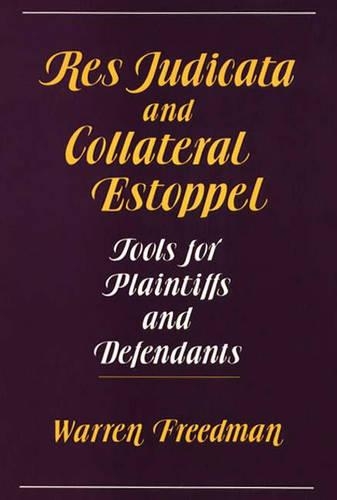
Res Judicata and Collateral Estoppel: Tools for Plaintiffs and Defendants
(Hardback)
Publishing Details
Res Judicata and Collateral Estoppel: Tools for Plaintiffs and Defendants
By (Author) Warren Freedman
Bloomsbury Publishing PLC
Praeger Publishers Inc
22nd February 1988
United States
Classifications
Tertiary Education
Non Fiction
347.3075
Physical Properties
Hardback
131
Description
With court calendars already overcrowded and the number of civil cases steadily mounting, prolonged litigation and successive lawsuits are becoming an increasing burden on plaintiffs, defendants, and the court system alike. The doctrines of res judicata and collateral estoppel, which are well respected by both the bench and the bar, offer the best means for avoiding such situations and for reaching swift and definitive judgement. This volume is the first work to provide clear, fully documented discussion of the subject, even for the nonspecialist attorney or manager. Written by a seasoned legal professional, it incorporates citations and systematic analyses of the most recent applicable case law.
Reviews
This book is both narrower and broader in scope than its title indicates. It is narrower, for example, in that it gives very little analysis of collateral estoppel and none of res judicata as applied in public actions. (Moreover that brief discussion treats administrative' and governmental' estoppel separately without dealing with the fact that the former is subsumed under the latter- and leaves the reader with little basis for reconciling apparently conflicting authorities). It is broader than the title in that it makes passing reference to a host of devices for precluding a party from pursuing an action or raising an issue, including stare decisis and estoppel by deed. Overall, the inclusion of some of these leads the reader to wonder as to the author's overall objectives for the book.-Law Books in Review
"This book is both narrower and broader in scope than its title indicates. It is narrower, for example, in that it gives very little analysis of collateral estoppel and none of res judicata as applied in public actions. (Moreover that brief discussion treats administrative' and governmental' estoppel separately without dealing with the fact that the former is subsumed under the latter- and leaves the reader with little basis for reconciling apparently conflicting authorities). It is broader than the title in that it makes passing reference to a host of devices for precluding a party from pursuing an action or raising an issue, including stare decisis and estoppel by deed. Overall, the inclusion of some of these leads the reader to wonder as to the author's overall objectives for the book."-Law Books in Review
Author Bio
WARREN FREEDMAN, member of the New York, Federal, and U.S. Supreme Court Bars, served as corporate counsel to Bristol-Meyers Company for 20 years in addition to his private law practice.
